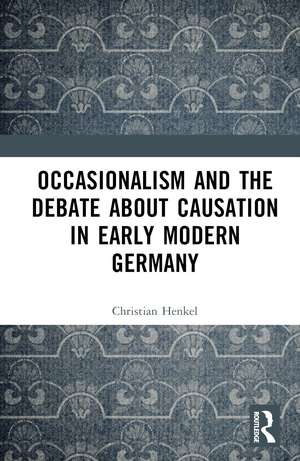Occasionalism and the Debate about Causation in Early Modern Germany
Autor Christian Henkelen Limba Engleză Hardback – apr 2024
Occasionalism is most often associated with Cartesian early modern Christian philosophers, the most famous of whom is perhaps Nicolas Malebranche. Early modern German occasionalism has received very little scholarly attention, leaving us with an incomplete picture of the German causation debate from Leibniz to Kant. This book combines a chronological investigation of four influential and historically connected cases of occasionalism in early modern Germany with a reconstruction of arguments to address specific problems in metaphysics, natural philosophy, philosophy of language, and philosophy of psychology. Providing a sufficient ground for nature and human beings’ mental and physical existence is a pressing issue for Weigel, Sturm, Wolff, and Ploucquet. In examining the thought of these four understudied German philosophers, this book helps us rethink the relation between metaphysics of nature and science of nature and better understand the development of early modern debates about causation.
Occasionalism and the Debate about Causation in Early Modern Germany is an important resource for scholars and advanced students working on the history of early modern philosophy and the history of metaphysics and causation.
Preț: 1002.95 lei
Preț vechi: 1223.11 lei
-18% Nou
Puncte Express: 1504
Preț estimativ în valută:
191.94€ • 199.65$ • 158.46£
191.94€ • 199.65$ • 158.46£
Carte tipărită la comandă
Livrare economică 14-28 aprilie
Preluare comenzi: 021 569.72.76
Specificații
ISBN-13: 9781032710419
ISBN-10: 1032710411
Pagini: 202
Dimensiuni: 152 x 229 x 13 mm
Greutate: 0.53 kg
Ediția:1
Editura: Taylor & Francis
Colecția Routledge
Locul publicării:Oxford, United Kingdom
ISBN-10: 1032710411
Pagini: 202
Dimensiuni: 152 x 229 x 13 mm
Greutate: 0.53 kg
Ediția:1
Editura: Taylor & Francis
Colecția Routledge
Locul publicării:Oxford, United Kingdom
Public țintă
Postgraduate and Undergraduate AdvancedCuprins
Introduction 1. Erhard Weigel. Continuous Creation, Discontinuous Time, and Occasionalism 2. Johann Christoph Sturm. Mechanism, Occasionalism, and Final Causes 3. Christian Wolff. Mind-body Interaction, Language, and Occasionalism 4. Gottfried Ploucquet. Occasionalism and the Grounding of Sense-Perception Conclusion Appendix: Biographical Sketches
Recenzii
“For a long time, early modern Germany remained a foggy land. Only a few towering peaks—Leibniz, Wolff, Kant—could be discerned. Today, new light is lifting the fog and we are discovering a much more complex and diverse landscape. By drawing attention to the vibrancy of early modern German debates about causation and the spread of occasionalism, Henkel's book contributes to this change of perspective. It is an exciting story that has been waiting to be told.”
Andrea Sangiacomo, Groningen University, The Netherlands
“This book fills an important gap in our understanding of early modern causation and occasionalism. Henkel’s clear and authoritative work will serve as an essential guide to those interested in the tradition of occasionalism as it evolved in the important era from Leibniz to Kant.”
Jeffrey K. McDonough, Harvard University, USA
Andrea Sangiacomo, Groningen University, The Netherlands
“This book fills an important gap in our understanding of early modern causation and occasionalism. Henkel’s clear and authoritative work will serve as an essential guide to those interested in the tradition of occasionalism as it evolved in the important era from Leibniz to Kant.”
Jeffrey K. McDonough, Harvard University, USA
Notă biografică
Christian Henkel is a Postdoctoral Researcher at the University of Montreal, Canada. His work focuses on seventeenth- and eighteenth-century metaphysics and natural philosophy. His published work has appeared in the British Journal for the History of Philosophy and Early Science and Medicine.
Descriere
This is the first book to focus on occasionalism in early modern German philosophy. It demonstrates that occasionalism provided a strong foundation for the thought of four important yet underexamined German philosophers: Erhard Weigel, Johann Christoph Sturm, Christian Wolff, and Gottfried Ploucquet.
